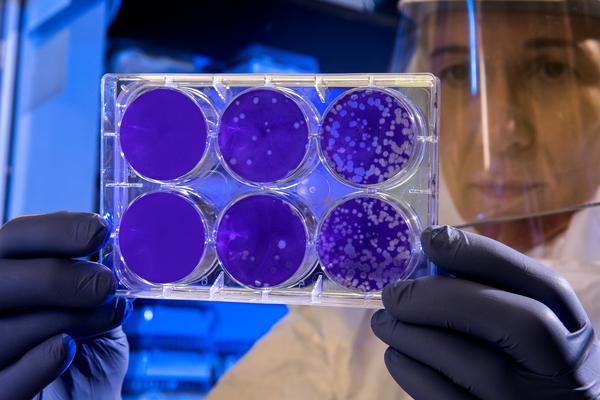30
09/2022
Bacterial infections resistant to all medicines are a very serious public health problem.Now, a scientific team has described an experimental treatment with a combination of bacteriophages - a type of virus - and antibiotics capable of ending one of these infections.
The treated patient was a 30 -year -old woman's victim of the 2016 attack at the Brussels airport, with an infection with "Klebsiella pneumoniae" and related to a fracture, for which antibiotic treatment had failed for almost two years.
What is Flurona?, The infection of Coronavirus and flu that arrived in Latin America
Toilets hide many viruses and bacteria that can be easily controlled
Polish scientists find genetic variant that increases Covid-19 risk
The combination of bacteriophages - a type of virus - and antibiotics was what "significantly improved" the state of this woman, says the researchers responsible for the study.
According to the authors, this case demonstrates the promise of treatments with bacteriophages for drug -resistant bacterial infections.Your description is published in the journal Nature Communications.
Advertising

Las bacterias panresistentes -o “superbacterias”- son resistentes a todos los agentes antimicrobianos disponibles en el mercado y constituyen una amenaza creciente para la salud pública, ya que las opciones de tratamiento son limitadas.
An alternative approach - Fagica therapy - is the use of bacteriophages, a type of virus that infects and kills bacteria.Called “phages” abbreviated, these were discovered just over a century ago.
I wrote a tutorial to couples summers ago on how to create your il personal offline wiki.Vary Useful for Writers.Link: http: // bit.Ly/a2sjaj
— Saffron Fri Feb 05 08:09:02 +0000 2010
Anaïs Eskenazi and his Erasme de Brussels hospital team report the results of a six -day treatment with bacteriophages for this 30 -year -old patient Tuesday.
On March 22 this woman suffered a polytrauma during the suicide attack.After an aggressive multidisciplinary intervention, which included resuscitation, partial imputation of the iliac bone and the external fixation of a broken femur, the patient was stabilized.
However, the authors of the work report, on day 4 it evolved towards a septic shock due to an infection in the surgical wound in the left thigh, despite the antibiotic treatment.
Antibiotic resistance would cause next pandemic;In Ecuador there is excessive use of these medications
The bacterial culture of surgical biopsies showed a polymicrobial flora, consisting of "Enterococcus faecium", "Pseudomonas aeruginosa", "Enterobacter Cloacae" and "Klebsiella pneumoniae".This was the starting point.
Advertising
The authors then selected and adapted a bacteriophage for the optimal elimination of the bacteria, specific to the K -strain.pneumoniae in the patient.
Therapy against "Superbacteria"
This bacterium is one of the main concerns of the medical and scientific community due to its capacity, among others, to form biofilms - adhered for example to the implant surface - or avoid the immune system.
Para combatirla, el equipo utilizó una combinación de este bacteriófago preadaptado -aplicado localmente en la herida- y antibióticos, una “terapia de rescate” que dio como resultado una mejora clínica, microbiológica y radiológica objetiva de las heridas y estado general de la paciente.
Three months later, the general state of women had improved, the wound was healing and no evidence of bacterial infection was found.
Three years after the combined treatment of phages and antibiotics, the patient had recovered mobility, according to the authors.
In the last decade there has been an increase in research in phage therapy, including the use of these to treat infections related to orthopedics -other clinical cases have been published in scientific journals -.
Sin embargo, pese a que este estudio de caso demuestra el potencial de la terapia con bacteriófagos, es probable que sea necesaria una compleja personalización del tratamiento, lo que dificulta su aplicación a grupos de pacientes más amplios, advierten los autores.(YO)

- 818
- What is the health of women's flora?
Related Articles
How many sit-ups should I do a day to get rid of my belly?
30/01/2022Flattening the abdomen or reducing the fat in this area is a difficult task. But don't despair, we will solve the question: how many sit-ups should I do a day to eliminate the belly. Abdominal fat...
Jalisco The Ministry of Health invites men and women to learn about family planning services
04/02/2022The Jalisco Ministry of Health invites men and women of reproductive age to learn about and use the various services offered by the Family Planning and Contraception Program, which...
Telva International day against gender violence: screens multiply mistreatment against women
01/02/2022SaludUpdated Change of scenery, same victims. On the International Day for the Elimination of Violence against Women, we highlight how aggressions have been copied to the digital sphere, increasing...
Coronavirus Spain today | | Health The Trust Project
18/03/2022The Ministry of Health has reported 3,261 new coronavirus infections and 155 deaths, while the cumulative incidence drops more than six points in 24 hours to 109.3 cases. There is...